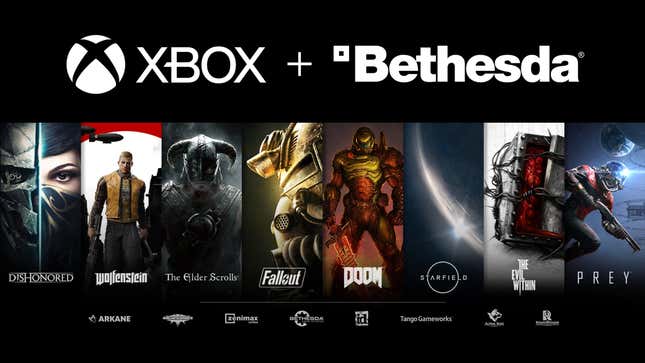
Microsoft’s $7.5 billion purchase of Zenimax Media, parent company of Fallout, The Elder Scrolls, and Doom maker Bethesda, has cleared another set of hurdles, winning approval to proceed from both the European Commission and US Securities and Exchange Commissions.
“The Commission concluded that the proposed acquisition would raise no competition concerns, given the combined entity’s limited market position upstream and the presence of strong downstream competitors in the distribution of video games,” reads a new update on the European Commission’s website.
The SEC has similarly given the greenlight. As NME first reported, a Note of Effectiveness was posted to the regulatory agency’s website on March 4 meaning it has accepted the details of the acquisition as submitted by Microsoft, including the effect on share prices. Previously, Zenimax Media was a privately held company, whereas Microsoft is publicly traded.
The plans for the deal were first announced last September, with the acquisition expected to be completed sometime later this year. While that will bring Microsoft’s total number of first-party game studios up to a whopping 23, it remains to be seen how the company will leverage games from Bethesda which have traditionally been multiplatform.
Upcoming Bethesda games like Arkane’s Deathloop and Tango Gameworks’ Ghostwire: Tokyo, both PS5-console exclusives set to come out in 2021, will stick to the terms of those original deals, Microsoft had previously confirmed. At the same time the company has kept the door open to making games beyond that, like The Elder Scrolls VI and Starfield, Xbox exclusives. In an interview with CNBC last September, Xbox boss Phil Spencer said games like these would be available day-and-date on Xbox Game Pass, but told Bloomberg that exclusivity would be decided on a case-by-case basis.
In an interview with Kotaku last October, Spencer said that it would be possible for Microsoft to recoup the cost of the acquisition without bringing games like The Elder Scrolls VI to PlayStation. “[W]hen I think about where people are going to be playing and the number of devices that we had, and we have xCloud and PC and Game Pass and our console base, I don’t have to go ship those games on any other platform other than the platforms that we support in order to kind of make the deal work for us,” he said.
While the deal hasn’t yet been finalized, it’s apparently already had an effect on the rest of the game development landscape. Last month, Kotaku reported that Google Stadia head Phil Harrison told staff in an internal meeting that Microsoft’s acquisition was one of the factors that had led it to close the book on first-party game development less than two years into the formation of entirely new studios.